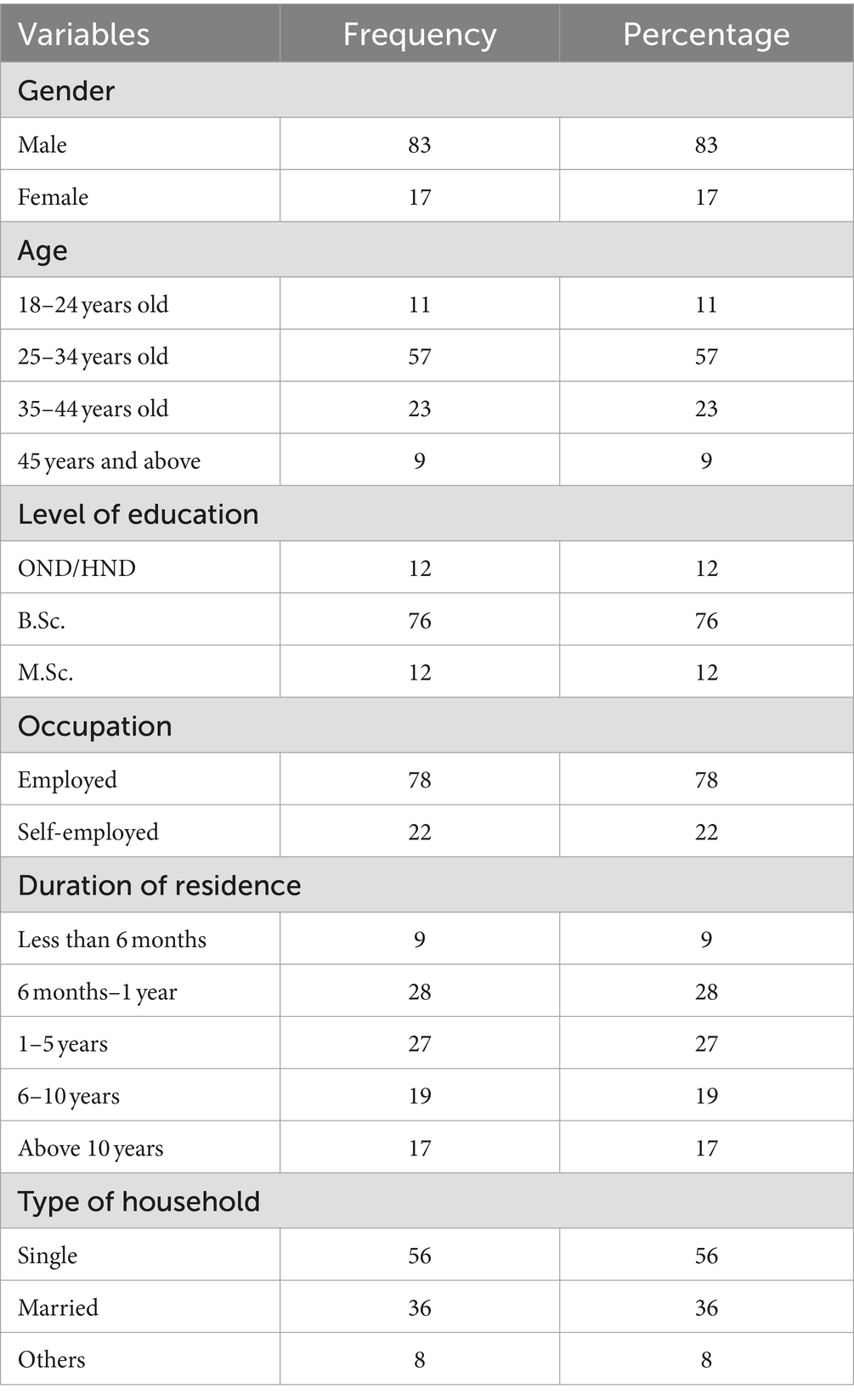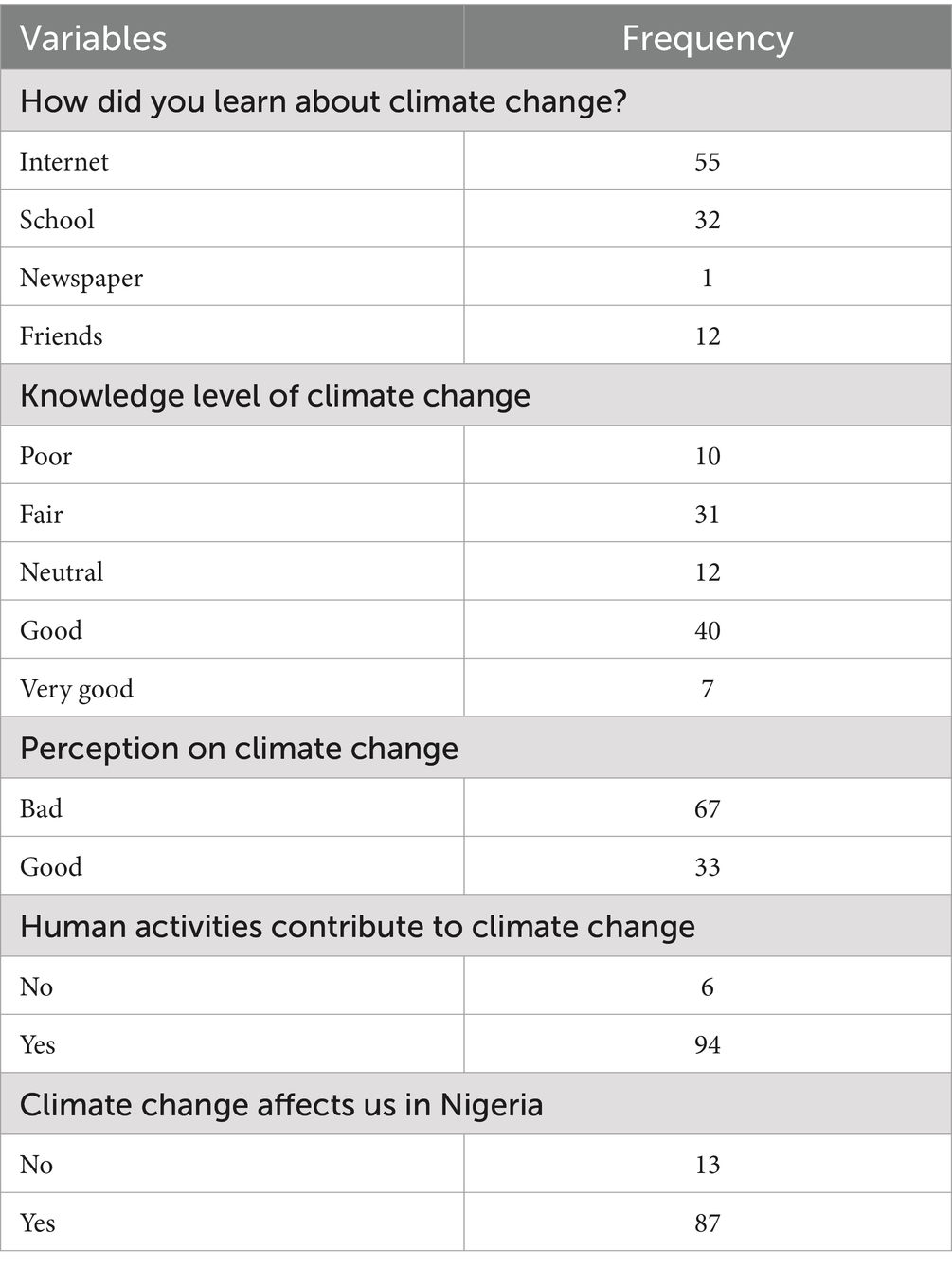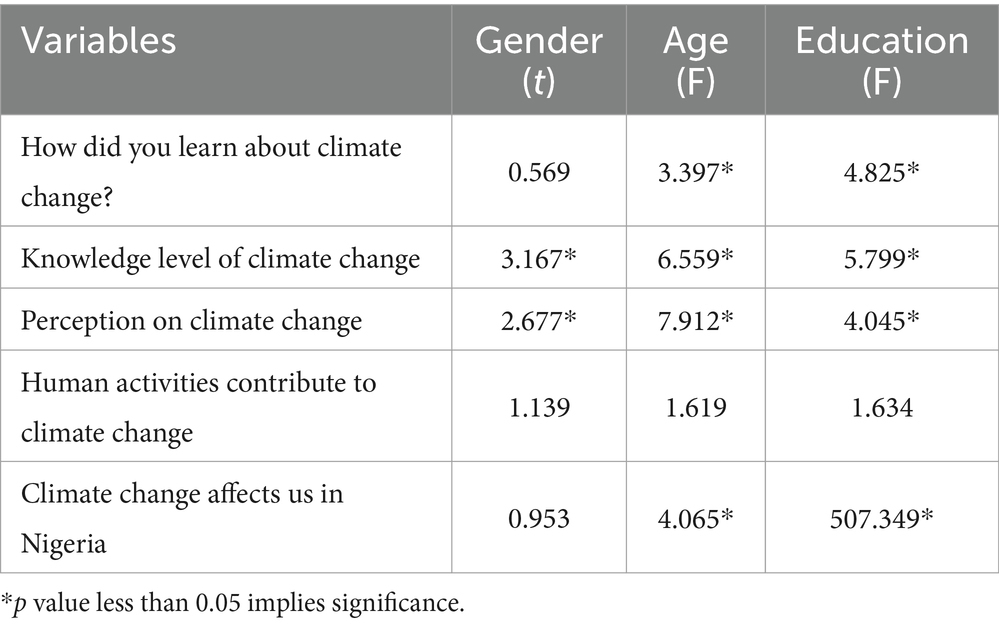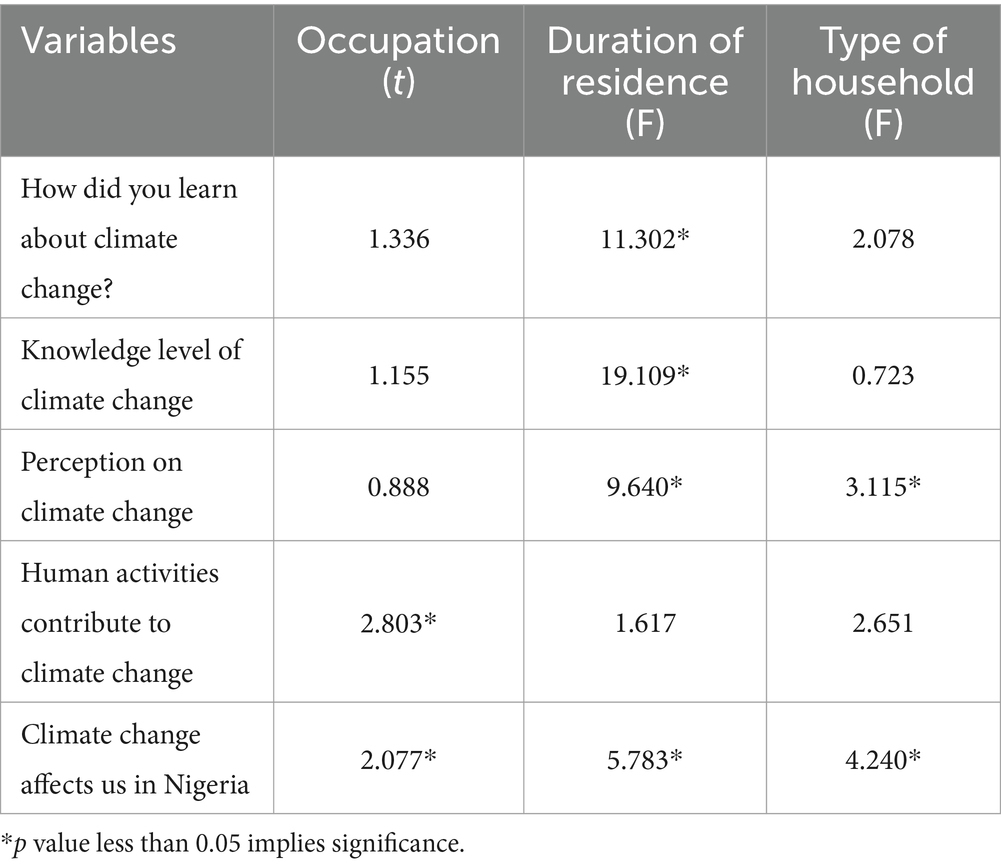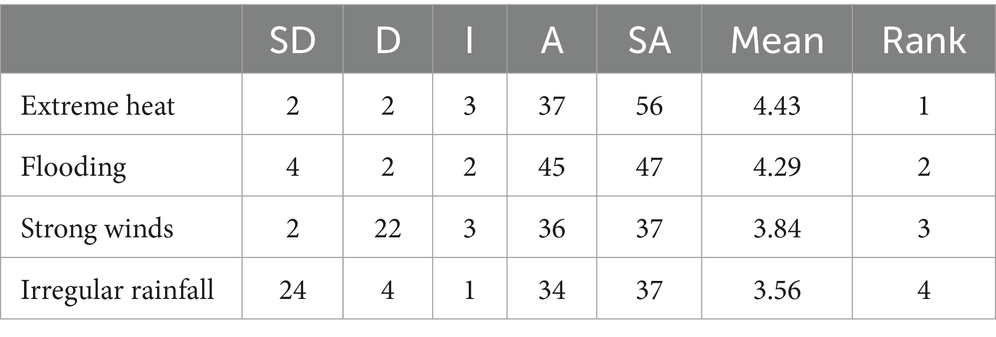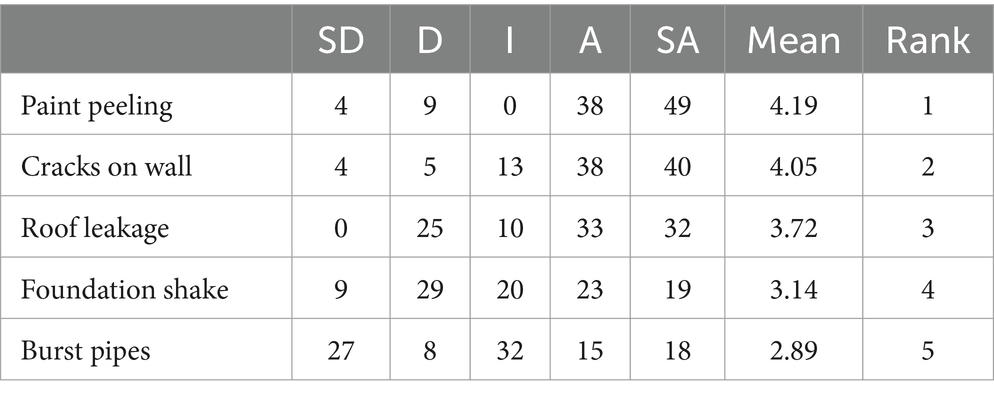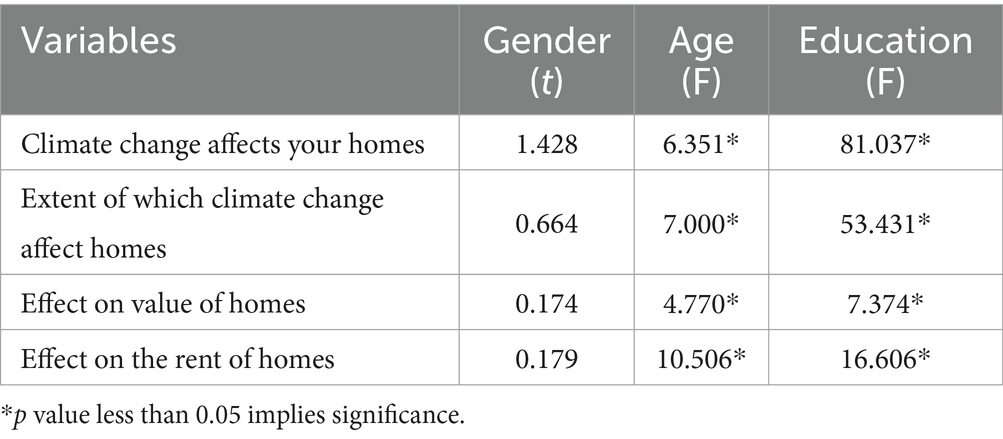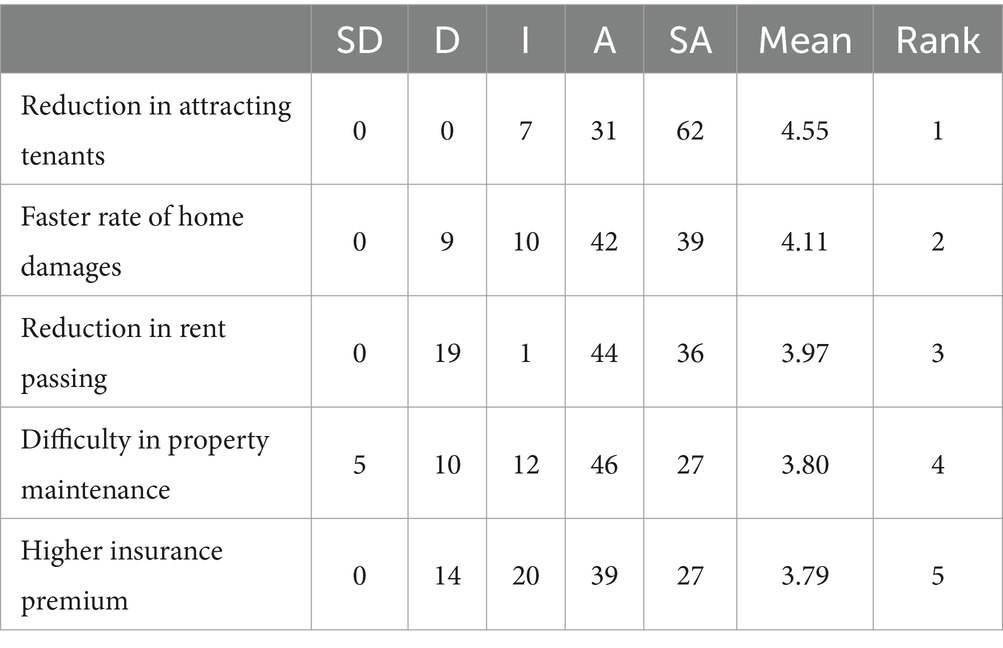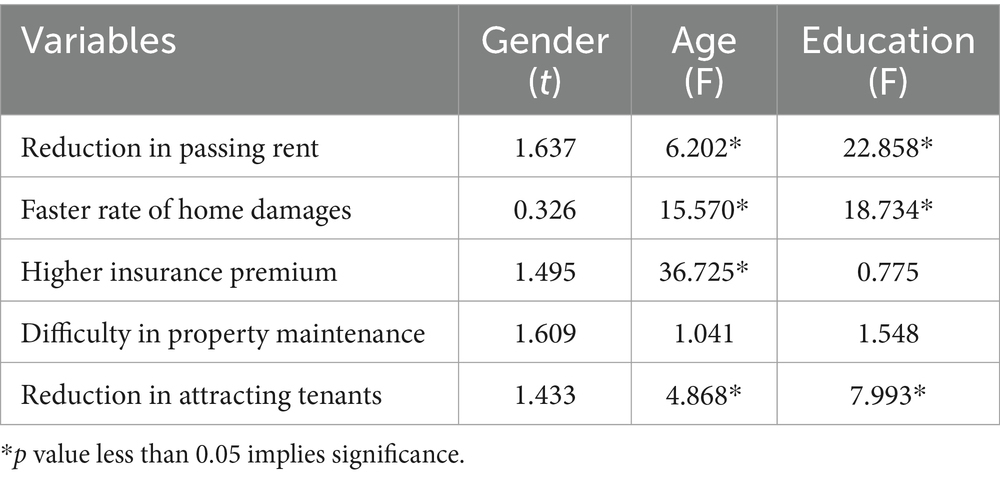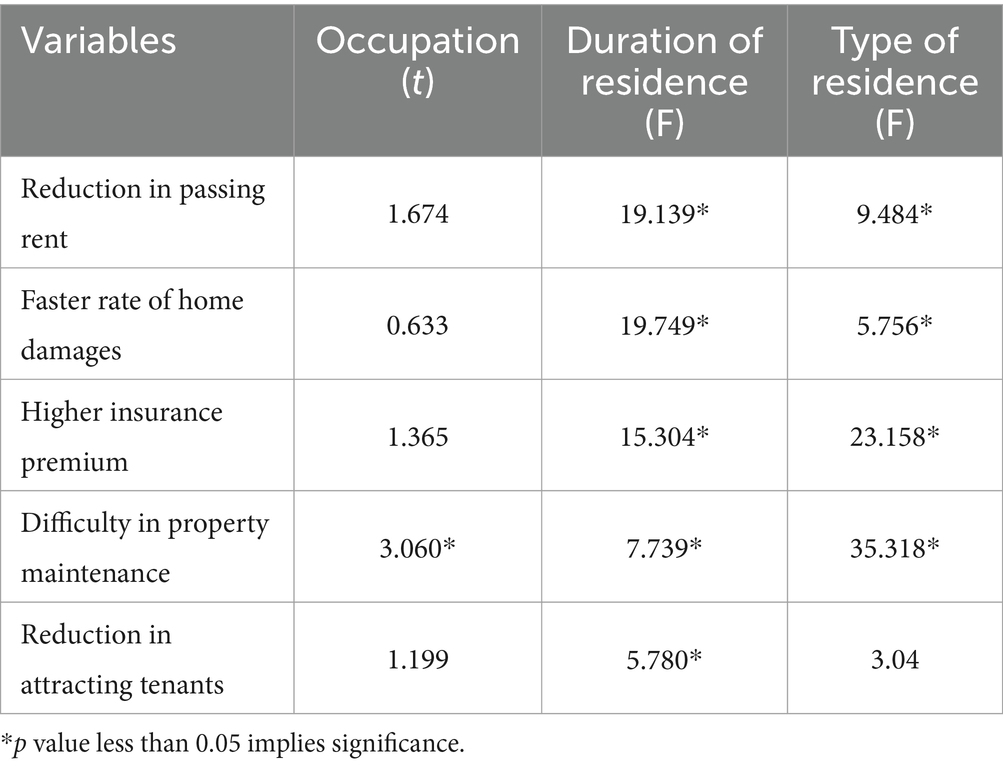- 1Department of Estate Management, Lagos State University, Epe, Nigeria
- 2Sydani Institute for Research and Innovation, Sydani Group, Abuja, Nigeria
- 3Department of Estate Management, Covenant University, Ota, Nigeria
The real estate sector is significantly impacted by climate change, with effects ranging from increasing risks of flooding and wildfires to shifting demand for certain types of property. These impacts influence insurance prices, property maintenance procedures, and the overall desirability of specific homes. While climate risk is acknowledged in the financial industry, its implications for the commercial and residential real estate sector are mostly studied in developed countries, with limited research in developing countries like Nigeria. This study attempts to fill this gap by exploring the potential impacts of climate change on residential properties in Lagos State, Nigeria, using Wemabod properties as a case study. The methodology involved analyzing primary data collected from residents of Wemabod Estate, Ikeja, Lagos, Nigeria, with purposive sampling used to recruit 100 participants due to absence of reliable census data. Data analysis was conducted using mean rank, t-test, and analysis of variance (ANOVA). Findings showed that most respondents demonstrated a good level of awareness about climate change. Analysis revealed that residential characteristics such as age, gender, level of education, and knowledge level of climate risk significantly influenced residents’ climate change coping and adaptation strategies, with notable mean differences in knowledge and perception based on these factors. The major perceived effects of climate change included extreme heat and flooding, followed by strong winds and irregular rainfall, leading to property impacts such as peeling paint, wall cracks, roof leakage, foundation shake, and burst pipes. These findings indicate that extreme heat and flooding are the primary climate change manifestations affecting residential properties in Lagos State. Property owners should implement measures to protect against these effects, regularly inspect and maintain their properties, consider climate risk in their insurance and maintenance plans, and stay informed about climate change impacts. This study underscores the need for further research on climate change’s impact on real estate in developing countries to better understand and mitigate these risks.
1 Introduction
Global warming, defined as a constant increase in the earth’s temperature, has been occurring for some time and has accelerated dramatically during the last century due to the use of fossil fuels. The uncontrolled emission of harmful gases from industries traps heat from the sun in the earth’s atmosphere, consequently increasing the earth’s temperature. This gradual rise snowballs into global warming and climate change, with the capacity to create uncertainties across all countries in the world (Keighley et al., 2018). Climate change has become an undeniable science, and while the variability in the timing of its consequences remains uncertain, the frequency and severity of climate change risks are increasing substantially, leading to property damage and quality of life impacts on communities in Nigeria and around the world.
Real estate is widely regarded as one of the world’s most important economic industries (Farhaoui and Slimani, 2022). It is no wonder that urgent action should be taken to mitigate the difficulties presented by climate risk to the real estate sector in every facet of the business. Many institutional real estate investors are heavily invested in economically significant cities and regions that are becoming increasingly vulnerable to the effects of climate change (Fisher and Rutledge, 2021). For instance, there are extensive warnings from the Vice Chairman of Coldwell Banker Richard Ellis (CBRE), Mr. Paul Morassutti, in the US, that climate risk will heavily affect the sector in numerous ways (Wang and Zhou, 2021). Climate change is increasing the frequency and intensity of storms and floods, making large estuary and coastal cities more vulnerable to flooding (Dachary-Bernard and Vergneau, 2023). Extreme weather caused by climate change has led to forced migration, abandonment of property, and erosion of property values in climate-prone areas. Excessive heat and cold are expected to lead to the gradual deterioration of property, making a long-term return on investment in property potentially unfeasible (Karadimitriou et al., 2022). Areas prone to adverse climate effects like storms, heat waves, and intense droughts can see reduced property prices, as these properties appear less attractive and appealing to consumers, thus reducing demand (Ashaolu, 2018). Thankfully, concerted public investment in infrastructure for risk mitigation is critical to ensuring adaptation to climate-related dangers and natural disasters (Truong and Trück, 2016).
Unfortunately, awareness of the issue of climate risk appears to be low, especially in developing countries. This lack of awareness has led to immense damage to property through global warming and other climate risks. The perception of global warming varies among individuals, making it crucial for people to have a good understanding of climate risks to create effective adaptation strategies to mitigate their impact on property. Perception involves the use of sensory and cognitive processes to appreciate, value, discern, rank, and compare things. As much as scientists have predicted climate crises, understanding the perception of climate change effects helps determine people’s knowledge level on the subject. As people become more aware of climate risks, there may be a behavioral change or shift in demand for properties in safer and more climate-resilient locations. This awareness can lead to better property management practices that positively impact the durability of the property, its rent, prices, and property values, resulting in intense competition for available land amid spiraling demand. The aim of this paper is to examine tenants’ perception of the effects of climate change on residential properties in Ikeja, Lagos State, to provide information that could enhance real estate investment.
2 Literature review
The phenomenal rise in population in Nigeria will increase pressure on limited land resources, resulting in an acute shortage of houses, leading to overcrowding, high rent, depression, and a reduction in the quality of life for those living in urban areas (Aluko, 2010). The population rise, combined with climate change and other socioeconomic factors, can cause considerable strain on land resources. Rapid population growth coupled with climate change has been found to result in rapidly expanding slums (Ajibade and McBean, 2014; Oloyede et al., 2014) and other forms of informal settlements (Cobbinah and Finn, 2023). Consequently, climate change can have significant effects on different aspects of property (Ezennia and Hoskara, 2019).
Climate change contributes to property defects, although properties or buildings are commonly understood to be subject to faults, typically occurring in building sections such as roofs, walls, floors, ceilings, toilets, doors, and windows (Amusan et al., 2019). The effects of climate change on building defects have not received much attention in African countries like Nigeria. The study by Bakri and Mydin (2014) discovered regular building defects, including timber decay, wall cracks, erosion of mortar joints, peeling paint, defective plaster rendering, dampness, insect or termite attacks, fungi and small plant attacks, roof defects, sagging or deformation, and imbalance in foundation and services, but found no link to climate change. In Malaysia, Ali et al. (2013) focused on detecting building elements with design flaws, discovering common design flaws in building façades and missing slots beneath floor slabs, but did not identify flaws attributable to climate change, particularly in residential buildings. Chong and Low (2006) investigated failure mechanisms resulting in design-related latent defects and the design parameters that could be employed to prevent those flaws. In a survey conducted over 9 months on 74 buildings, the study discovered defects such as paint and plaster patching, stains, water seepage, chipped concrete, tile cracks, plaster cracks, paint peeling and blistering, and tile propping. The major three design-related failure causes were impacts from occupants, weather impacts, and load and moisture from wet areas. Looking at the impacts of climate change on property in developed countries, Miller and Hutchins (2017) investigated the impact of climate change on commercial property in the UK. The study identified effects of climate risk on buildings, including more frequent flooding, increased temperature variation on building interiors and exteriors, frequent storms and severe winds, increased winter rainfall, and summer drought influencing weather penetration and causing structural damage. Similar studies are needed in African countries such as Nigeria to reflect each region’s unique characteristics.
2.1 People’s perception of climate change risk
Egbe et al. (2014) investigated rural people’s perceptions of climate change in selected villages in Cross River State, Nigeria. Data from 120 rural inhabitants in four communities revealed that the majority are aware of climate change caused by natural sources, with some instances due to human activity. Effects of climate change recognized include decreased agricultural yields, poverty, diminished soil fertility, increased floods, and inadequate food supply, highlighting the need for a study on the effects of climate change on residential properties. Ishaya and Abaje (2008) explored how indigenous people in the Jema’a Local Government Area of Kaduna State understood climate change and their adaptation techniques. Data from 200 respondents revealed that respondents primarily attributed climate change to human activities, with effects more severe on health, food supply, biodiversity loss, and fuelwood availability than on businesses. Impeding issues included lack of better seeds, lack of access to water for irrigation, lack of current knowledge of modern adaptation tactics, lack of money, and lack of awareness and knowledge of climate change scenarios.
Otegbulu et al. (2011) evaluated how construction and household activities led to global warming, climate change, and environmental pollution in Lagos, Nigeria. Data from 120 houses and 30 professional estate surveyors in Lagos metropolis revealed that household activities resulted in global warming and climate change. The study recommended improved power supply and more energy-efficient practices among families. Similarly, Oladokun (2016) discovered climate change-related building flaws and investigated the impact of climate change on commercial properties in Lagos State. Data from 270 practicing estate surveying firms revealed that ‘joint failure’ is a major problem caused by climate change, along with roof leaks, algae growth, and wear and tear. These flaws are related to workmanship and materials, which appear to have been either too weak or insufficient to endure the harsh weather brought on by climate change. Perceived effects of climate change on commercial properties include infrastructure damage, health concerns, high rates of deterioration, loss of income, increased maintenance costs, and decreased property value. The study recommends conducting similar studies in other geopolitical zones of the country and other types of property to fill the gap.
Most effects identified in the various studies are driven by factors including increasing temperatures, extreme weather events, changing precipitation patterns, and sea-level rise, leading to property damage, accelerated aging, and high insurance costs due to climate change-induced high risk (Aliu, 2016). Opoko and Oluwatayo (2014) warned that climate change is likely to exacerbate acute housing shortages in Nigerian big cities, especially those close to water bodies, due to predicted irregular rainfall patterns in the coming years, with coastal cities at the top risk of flooding. Unfortunately, local community adaptation to natural disasters such as flooding in Warri cannot match the expected magnitude of flooding caused by climate change (Odemerho, 2015).
2.2 Climate change adaptation and mitigation strategies
Climate change adaptation and mitigation strategies can help reduce the negative impacts on property in climate-prone areas. A wide range of coping and mitigation strategies have been proposed, emphasizing the need for awareness to be matched with action to be effective (Popoola et al., 2020). Okunola et al. (2022) investigated the factors impacting individual and household adaptation methods to climate risk in Port Harcourt Metropolis, Nigeria, using data from 384 randomly selected household heads in various residential densities across the city. The study found that adaptation mechanisms were reactive rather than predictive, varying in size depending on household densities. Recommendations included integrating and executing climate change adaptation policies and launching a comprehensive awareness campaign to reduce household vulnerability and improve their climate change absorptive, adaptable, and transformative skills in the city. Additionally, greening, and urban green infrastructure have been proposed but are yet to be fully adopted in Nigeria (Adegun et al., 2021). However, the financial implications of adopting such strategies may not be sustainable. The case for strict land-use regulation has been noted, although it may increase the price of houses and rents when implemented (Leibowicz, 2017). A related study examined factors influencing residents’ adaptation and coping strategies to the looming effects of climate change in Lagos, Nigeria (Okunola and Bako, 2023), focusing specifically on the effect on housing. The sample characteristics of the study were homogeneous (residents of an estate), but the sampling frame included respondents from different ages, income levels, education levels, ethnic, religious, and cultural backgrounds. Such divergent views are essential for inclusivity and understanding sampling characteristics when disaggregated. The findings revealed that the adaptation mechanisms used by residents in various residential areas were comparable but differed in degree. Residential characteristics such as education, average monthly income, age, house style, and home ownership all had a substantial impact on the climate change adaptation techniques adopted by the residents.
2.3 Steps property users can take to mitigate climate change risks
Climate change is a significant concern for property owners. As climate change accelerates and extreme weather continues to wreak devastation on homes nationwide and around the world, there is a need for measures that homeowners, tenants, or occupants of buildings can adopt to fortify and protect their homes and property against climate change risks. Porter (2024) recommended basic maintenance methods, such as cleaning the gutters on a regular basis and applying a fresh coat of paint, to avoid more major damage from occurring over time. Larger upgrades, such as rebuilding the roof or repairing damaged shingles, can reduce the likelihood of costly leaks. Other strategies to minimize future wildfire damage include installing chicken wire inside attic vents and making landscaping changes. Adapting homes to changing weather and environments can make them more comfortable while also retaining their value.
Insulation is a vital component in any home aiming to be energy-efficient. Poor insulation leads to heat loss in winter and higher cooling costs in summer (Porter, 2024). It is typically placed in areas where air escapes or heat transfer occurs, such as between stud cavities inside walls and in the roof, making it the easiest method of conserving energy from thermal losses in a home. Proper insulation can help save money on climate control. Odoko and Olokpo (2018) emphasized the need for properties in Nigeria to be insulated, especially considering the country’s tropical climate due to its proximity to the equator and the Atlantic Ocean, leading to generally hot temperatures. Given Nigeria’s main building construction materials, including zinc, long-span aluminum roofing sheets, and concrete masonry units, Nigerian dwellings must be insulated against the heat.
Painting the external part of buildings can help reduce heat or fire risk. Heat-resistant paints, some of which can withstand temperatures up to 800°C, protect surfaces against thermal damage while maintaining an aesthetic appearance. These paints come in various temperature resistances, affecting their durability and effectiveness in protecting surfaces. Heat-resistant products used in construction include those for painting staircases, stairs, doors, walls, and roofs (Nutakki et al., 2023). It is often advised to use light colors or other reflective materials on the exterior of the property, as dark colors can absorb light and heat, making the interior warm (Peter et al., 2023).
Purchasing insurance is another measure to protect one’s property against natural disasters. Despite all precautions, some risks cannot be avoided. Fires, storms, floods, or other climate change-related disasters may still cause property damage. Purchasing an insurance policy is the best way to protect one’s property against these types of losses (Porter, 2024).
3 Materials and methods
Wemabod Estate is one of several estates located in Ikeja with many residential units. The estate is large compared to many other estates in the area. This study finds Wemabod Estate an appropriate location for the study to fill the gap in literature, as there are limited studies on this subject in the country, for the following reasons:
1. Lagos State often witnesses flooding, which many experts attribute to climate effects (Ansah et al., 2024).
2. The large number of housing units within the estate suggests vulnerability to climate change challenges, contributing to greenhouse gas emissions through various activities within the estate.
3. The high population density and clustering of housing in the area is a risk factor for extreme heat, which has been gradually increasing due to climate change (Bassett et al., 2020).
The study population comprised residents of Wemabod Estate. The absence of reliable census data necessitated the adoption of purposive sampling. A sample of 100 residents was used (Denieffe, 2020). The estate, with its modern and up-to-date infrastructure containing over 250 housing units, has strict security, inhibiting easy access to the residents. Personnel working within the estate helped obtain information from the residents. Purposeful sampling was used to recruit respondents via a questionnaire designed solely for this purpose.
A questionnaire was developed based on the questionnaires and ideas presented by Allu (2014), Henseke and Breuste (2015), Pisello et al. (2017), and Fajilla et al. (2020). The questionnaire was divided into five sections. The first section contains demographic data. The second section measures the perception of climate change. The third section is divided into two subsections: the first subsection measures the effect of climate change on individuals, while the second subsection measures the effect of climate change on property. The fourth section assesses different dimensions of the effect of climate change on property. Finally, the fifth section evaluates the effect of climate change on property value.
Residents under the age of 18, hawkers, and non-residents with shops were not contacted and were not part of the study. The statistical methods used for data analysis included mean ranking, analysis of variance, t-test, and frequency analysis. A significant level of 0.05 was adopted for this study unless otherwise stated.
4 Result
4.1 Demographics
The demographic summary of the studied population (Wemabod Estate, Ikeja) is presented in Table 1.
The demographic analysis showed that 83% are males, which makes them more than the females, who are 17%. Ninety percent are between 25 and 44 years old. Seventy-eight percent are employed, while 22% are self-employed. Only 17% have lived in the residence for more than 10 years. Other demographic can be obtained from Table 1. This implies that the residents are adults, well knowledgeable as the majority are graduates, able to understand the concept of climate change, and identify the effects of climate change around their surroundings, especially in their place of residence.
4.2 Perception of climate change
The questions asked the residents focused on the varying levels of their awareness about the concept of climate change. This was summarized in Table 2.
The Internet (55%) and school (32%) are the two major sources of knowledge about climate change. Forty-seven (47%) of the respondents have above-average knowledge of climate change. Only 33% could be adjudged to have an adequate awareness level about climate change, while 94% believed that human activities contribute to climate change. Generally, 87% responded that climate change affects them in Nigeria. By implication, the respondents have good perception of climate risk, which is expected since majority are well learned, and they are in tune with the happenings on the internet and other sources of information as well.
4.3 Mean differences in awareness of climate change
The presence or non-existence of significant mean differences in respondents’ awareness level of climate change based on the six demographic factors (gender, age, educational attainment, occupation, length of residence, and type of household) was examined using the t test (t) and analysis of variance (ANOVA; F) presented in Tables 3, 4.
The t tests showed that there are significant mean differences of knowledge level in climate change and perception of climate change based on gender. The ANOVA test showed that there are significant mean age and education differences in all the variables except the perception that human activities contribute to climate change. This implies that residential characteristics, age, level of education, and difference in knowledge level of climate risk, were important elements impacting residents’ climate change adaptation strategy.
The t tests showed that there are significant mean differences in perceptions that human activities are responsible for climate change and that it affects Nigerians based on occupation. There is a significant mean difference in perceptions of climate change and that climate change affects all Nigerians based on the type of household. Additionally, there is a significant duration of residence mean difference in all variables except the perception that human activities contribute to climate change in Nigeria. By implication, the residents’ adequate knowledge of climate risk and its impact on the nation will invariably impact the adaptation strategy they will employ to combat the challenges associated with climate change.
4.4 Ranking of the effects of climate change on property
The mean rank of the effect of climate change as perceived by the respondents is presented in Table 5. The mean was obtained after a frequency analysis of the responses from the questionnaire. The mean rank ranges from the lowest point (1) to the highest point (5).
Extreme heat and flooding are the two major perceived effects or manifestations of climate change on the environment, while strong winds and irregular rainfall follow in descending order.
The detailed effects of climate change on property are presented in Table 6.
Paint peeling and cracks on the walls are the two most perceived effects of climate change on property. This is followed by roof leakage, foundation shake, and burst pipes in descending order.
4.5 Dimensions of the effect of climate change on property
Different questions focused on the extent of the effect of climate change on property. The responses are summarized in Table 7.
Most of the respondents, 82%, opined that climate change affects their homes. 57% responded that climate change impacts on their homes, while 51% believed that it also affects the rent. This further suggests that the people are knowledgeable about climate risk and its impact on property.
4.6 Mean differences on the dimensions of the effects of climate change on property
A t-test and an ANOVA were applied for these tasks to investigate the mean differences in the dimensions of the effects of climate change on property in the study area across the six socio-demographic variables. Table 8 results depicted no gender differences. However, there is a significant mean difference based on age and education. A continuation of the analysis is shown in Table 9, where there is a significant mean difference based on duration and type of residence. By implication, the effects of climate change appear to be in existence within the study area.
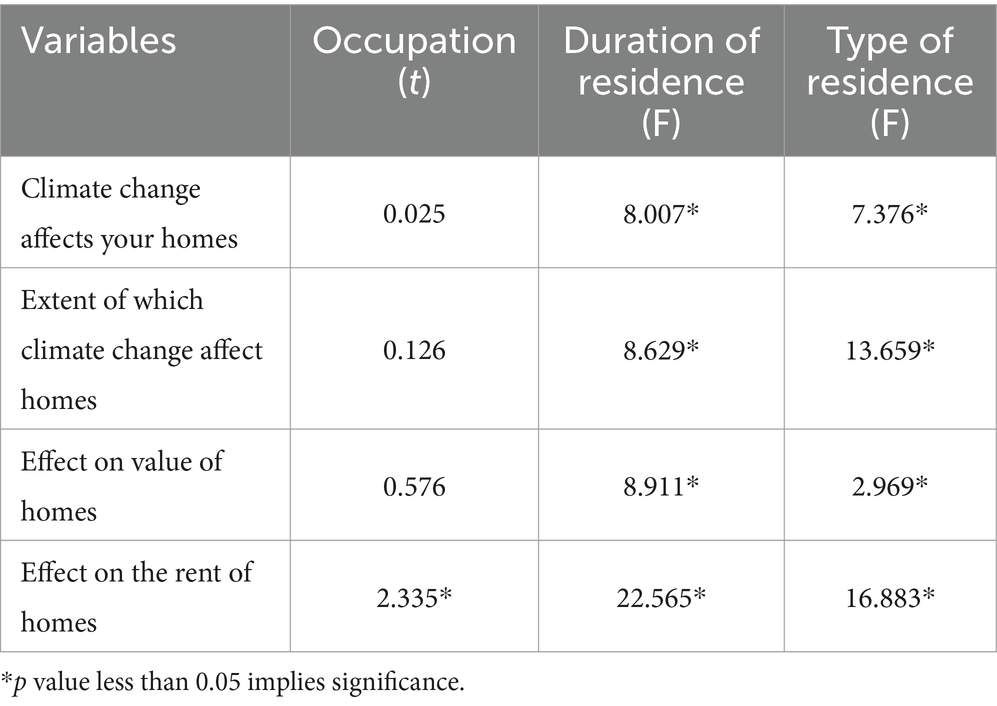
Table 9. Test of mean differences of effect different dimensions of climate change on property continued.
4.7 Examine the tenants’ perceptions of the effect of climate change on property management
This section sheds light on the respondents’ perceptions of the effect of climate change on property management through the use of the mean as displayed in Table 10.
Reduction in attracting tenants is the major effect of climate change on property because as the impacts of climate change becomes intense to quicken the rate of obsolescence in the buildings, it appears less attractive to prospective tenants or users. The next effects are faster rate of home damage, reduction in the rent prospective tenant is willing to pay for the property, difficulty in property management, and a higher insurance premium.
4.8 Mean differences on the effect of climate change on property management
A t-test and an ANOVA were used for these tasks to investigate the mean differences in the effect of climate change on property management in the study area across the six socio-demographic variables. From Table 11, there are no gender differences in the effect of climate change on property value. However, there is a significant mean difference in the effect of climate change on property management based on age, except in property maintenance.
A further examination, as shown in Table 12, revealed that there are significant mean differences in the effect of climate change on property management based on duration and type of residence.
5 Discussion
This paper has shown a fair level of awareness of climate change among residents in Wemabod Estate, Ikeja, Nigeria. An adequate level of climate change awareness is needed to build adaptation and mitigation strategies to cope with the impending challenges associated with rapidly changing climatic conditions (Akinola et al., 2020; Quandt et al., 2022). The Internet is the major source of information on climate change, which corroborates similar findings in Madaki et al. (2023). This is unsurprising as the estate is located in Lagos, Nigeria, a largely urbanized area with high internet and information and communication technology penetration. Expectedly, human activities are culpable for the looming climate crises, which, according to the respondents, have already been felt in Nigeria and around Africa (Tantoh et al., 2021).
This research revealed that while extreme heat and flooding are the leading effects of climate change on the environment, paint peeling, cracks on the wall, and roof leakage are the major manifestations in buildings. Climate change poses a severe and escalating threat to the built environment, exacerbated by the 4th industrial revolution. The impact on human life and housing is imminent, with rising temperatures and extreme weather events causing damage to houses, leading to shortages, displacement, destitution, homelessness, and health crises (Olagunju et al., 2021; Campbell et al., 2023). Recent natural disasters, such as flooding in some parts of Nigeria, underscore the urgent need for global support to address climate change’s devastating consequences on the overall wellbeing of Nigerians (Hassan et al., 2020). This also concurs with the submission from the respondents, who were of the opinion that climate change has impacted houses and rent, while reductions in rent, and faster rates of obsolescence are the major effects of climate change on property management. A similar submission can be found in Giglio et al. (2021).
The findings revealed variations in the knowledge level and perceptions of climate change among the respondents, with substantial mean differences observed based on gender, age, education, and duration of residence. These demographic factors play a pivotal role in shaping the understanding and perspectives of respondents regarding climate change. The disparities indicate that targeted interventions in the form of educational initiatives and awareness campaigns need to consider the diverse demographic characteristics of the population to effectively address gaps in climate change knowledge and perceptions. Implementation strategies can enhance engagement and promote a more comprehensive understanding of climate change across various demographic groups, contributing to a more informed and inclusive approach to climate action. Inclusivity here implies going beyond the respondents to involve other stakeholders that would move the needle in this aspect.
A substantial 82% of respondents in the Wemabod estate expressed the belief that climate change exerts an effect on their homes, highlighting a widespread acknowledgment of the environmental threat. Further analysis revealed that 57% of respondents perceived a direct effect of climate change on their homes, emphasizing the obvious consequences experienced by a significant portion of the surveyed population. Additionally, 51% of respondents believed that climate change extends its influence to rental dynamics, reflecting a worrying concern about the broader implications of climate change on the real estate sector, encompassing both owned and rented residential spaces. These findings underscore the urgent need for comprehensive climate resilience measures in housing and rental policies to address the identified concerns and promote sustainable living environments in Lagos, which is facing a housing crisis characterized by rapid urbanization, a growing population, and inadequate housing infrastructure (Auwalu and Bello, 2023). Failure to address the effect of climate change on housing will worsen the current shortage of affordable housing, leading to informal settlements, rent racketeering, overcrowded living conditions, and housing insecurity for a significant portion of the population that lives below the poverty level, which becomes magnified during the COVID-19 pandemic (Obasi and Anierobi, 2021).
This paper also found that a reduction in attracting tenants is the major effect of climate change on property value, which is closely followed by a faster rate of home damage. Reduction of property value came in third, while the last two were difficulty in property management and a higher insurance premium. These findings highlight the immediate challenges of tenant vacancy and increased repair costs, stressing the urgent need for climate-resilient building practices and adaptation strategies in Nigeria’s real estate sector. On the other hand, this paper has shown that most houses in Nigeria are not insured, as the respondents ranked insurance low. This is consistent with the country having a low level of health insurance coverage among its citizens (Alawode and Adewole, 2021).
Strikingly, the study indicates that gender and occupation do not yield discernible differences in the apparent effects of climate change on property values. This implies that, regardless of gender or occupational background, the adverse consequences of climate change on the market are uniformly recognized, emphasizing the need for comprehensive strategies to mitigate these effects and foster resilience in the property sector.
A combination of private, government, nongovernmental, and international development agencies is recommended to form synergy to craft measures to reduce the effects of climate change, especially in high-risk areas and low-resource settings. Further buildings must incorporate sustainability, intended to serve as an adaptation and coping strategy to mitigate the effects of climate change. Budgetary allocation for climate change planning, greening, and sustainability is highly recommended.
This study was limited to the perception of the residents to climate risk effects on residential property. Studies have shown that limited research have been done in this area, and therefore the need for more studies to fill the gap in literature. Moreover, the challenges of climate risk in the country, and across the globe has transcended beyond mere perception. There is the need for further study to measure the effects of climate change that have been seen, or have occurred in the study area, and by extension, in other regions of the country with a view to determine the exact adaptation and mitigation strategy that can be adopted. The last limitation is the adoption of purposive sampling limits the generalization of the findings. Hence, the result may not be generalized across Nigeria because of huge demographic differences across the six geopolitical regions of the country. Further studies could involve extending the survey to all the geopolitical regions and running a comparative analysis between urban and rural areas of Nigeria. The absence of extant literature in this context presents research opportunities that could be explored.
6 Conclusion and recommendation
The study shed light on the effects of climate change on residential properties in Lagos State. Findings in relation to the data garnered from the residents of Wemabod Estate, being the case study for the research, revealed that majority of the residents are well learned, mostly graduates of tertiary institutions, who are expected to be vast in knowledge about happening in their surroundings, and across the globe, as they are expected to be well exposed to the use of Information and Communication Technology (ICT), and also knowledgeable about the concept of climate change. Most of the respondents can be adjudged to have good level of awareness of climate change from the findings.
The findings in respect of whether residential characteristics, age, gender, level of education, and difference in knowledge level of climate risk, were the major features that impacted on the strategy adopted by the residents in coping and adaptating to climate change, showed that there are significant mean differences of knowledge level in climate change and perception of climate change based on the demographic factors. Extreme heat and flooding are the two major perceived effects or manifestations of climate change on the environment, while strong winds and irregular rainfall follow in descending order as the other manifestations of climate risk which has resulted in peeling of paints, cracks on the walls, roof leakage, foundation shake, and burst pipes as identified by the respondents in descending order of perception. Emanating from this is the fact that, these manifestations are more prevalent in this part of the world, and therefore property owners should watch against extreme cases of these effects and take steps to secure their properties from losses and damages arising from these risks or threats.
The most important conclusion is that climate change is not only a pressing environmental issue but also a significant driver of change in the property market and in property management practices. Climate risk affects all areas of the property estate market, from growing costs to the fall in appeal of specific regions and decline in demand of affected properties. Higher temperatures, storms, flooding, amongst other, are incidents impacting negatively on properties, result in difficulty in managing the cost and condition of property regularly. It is expected that more occupants of buildings would rely on electricity to power fans and HVAC systems to keep cool. The same is true for an increase in water usage. These developments may create an additional strain on the electrical grid and city resources. An increase in the demand for these resources will result in an increase in their prices. Damages due to weather variations, impacts seriously on properties making them start to lose their appeal which may result in loss or lower profit when attempting to sell a home in a high-risk location.
The study recommends the need for homeowners and users to take further steps away from being well acquainted with the truth about climate change and its impact on residential property, to acquire knowledge on how to mitigate the effects of climate and deploying such knowledge to mitigate the effects of climate on residential properties. The increasing relationship between climate change and property emphasizes the significance of remaining aware and proactive in dealing with these complicated concerns in a changing environment.
6.1 Actionable policy prescriptions
The research concludes by including ten (10) policy actions and their corresponding recommendations that will inform policymakers in mitigating the effects of climate change on residential properties in Nigeria (Table 13). The same could be applicable to other low resource settings or developing countries.
Data availability statement
The raw data supporting the conclusions of this article will be made available by the authors, without undue reservation.
Ethics statement
Ethical review and approval was not required for the study on human participants in accordance with the local legislation and institutional requirements. Written informed consent from the [patients/ participants OR patients/participants legal guardian/next of kin] was not required to participate in this study in accordance with the national legislation and the institutional requirements.
Author contributions
NP: Writing – original draft. HO: Writing – review & editing. MA: Writing – original draft. OS: Writing – review & editing. CI: Writing – original draft. SN: Writing – review & editing.
Funding
The author(s) declare that financial support was received for the research, authorship, and/or publication of this article. The authors declare that this study Sydani Group only paid the article processing charge. Sydani Group was not involved in the study design, collection, analysis, interpretation of data, the writing of this article, or the decision to submit it for publication.
Acknowledgments
The authors would like to thank Covenant University and Sydani Group for their support of this study.
Conflict of interest
HO, OS, and SN were employed by company Sydani Group.
The remaining authors declare that the research was conducted in the absence of any commercial or financial relationships that could be construed as a potential conflict of interest.
Publisher’s note
All claims expressed in this article are solely those of the authors and do not necessarily represent those of their affiliated organizations, or those of the publisher, the editors and the reviewers. Any product that may be evaluated in this article, or claim that may be made by its manufacturer, is not guaranteed or endorsed by the publisher.
References
Adegun, O. B., Ikudayisi, A. E., Morakinyo, T. E., and Olusoga, O. O. (2021). Urban green infrastructure in Nigeria: a review. Sci. Afr. 14:e01044. doi: 10.1016/j.sciaf.2021.e01044
Ajibade, I., and McBean, G. (2014). Climate extremes and housing rights: a political ecology of impacts, early warning and adaptation constraints in Lagos slum communities. Geoforum 55, 76–86. doi: 10.1016/j.geoforum.2014.05.005
Akinola, A. O., Opoko, A. P., Ibem, E. O., Okagbue, H. I., and Afolabi, A. O. (2020). Climate change adaptation and mitigation strategies in Lagos, Nigeria: built environment professionals’ perspective. Int. J. Eng. Adv. Technol. 9, 1273–1282. doi: 10.35940/ijeat.B2630.029320
Alawode, G. O., and Adewole, D. A. (2021). Assessment of the design and implementation challenges of the National Health Insurance Scheme in Nigeria: a qualitative study among sub-national level actors, healthcare and insurance providers. BMC Public Health 21, 1–12. doi: 10.1186/s12889-020-10133-5
Ali, A. S., Keong, K. C., Zakaria, N., Zolkafli, U., and Akashah, F. (2013). The effect of design on maintenance for school buildings in Penang, Malaysia. Struct. Surv. 31, 194–201. doi: 10.1108/SS-10-2012-0030
Aliu, I. R. (2016). Marginal land use and value characterizations in Lagos: untangling the drivers and implications for sustainability. Environ. Dev. Sustain. 18, 1615–1634. doi: 10.1007/s10668-015-9706-2
Allu, E. L. A. (2014). Climate change and buildings in Nigeria: A search for mitigation and adaptation framework for residential design guide. Doctoral Thesis, University of De Montfort University, Leicester. (Accessed December 19, 2022).
Aluko, O. E. (2010). The impact of urbanization on housing development: the Lagos experience, Nigeria. Ethiop. J. Environ. Stud. Manag. 3, 64–74. doi: 10.4314/ejesm.v3i3.63967
Amusan, L., Osinowo, S., Osawaru, F., Awotinde, L., Adelakun, A., and Peter, N. J. (2019). The building informatics approach to modelling construction quality assurance parameters to prevent structural collapse of building. Int. J. Technol. 10, 212–219. doi: 10.14716/ijtech.v10i2.1175
Ansah, E. W., Amoadu, M., Obeng, P., and Sarfo, J. O. (2024). Climate change, urban vulnerabilities and adaptation in Africa: a scoping review. Clim. Chang. 177:71. doi: 10.1007/s10584-024-03711-8
Ashaolu, T. A. (2018). Vulnerability of property market to poor infrastructure and changing climate: the case of Akute-Olambe suburb of Lagos, Nigeria. Ilaro J. Environ. Res. Dev. 2, 1–11.
Auwalu, F. K., and Bello, M. (2023). Exploring the contemporary challenges of urbanization and the role of sustainable urban development: a study of Lagos City, Nigeria. J. Contemp. Urban Affairs 7, 175–188. doi: 10.25034/ijcua.2023.v7n1-12
Bakri, N. N. O., and Mydin, M. A. O. (2014). General building defects: causes, symptoms and remedial work. Europ. J. Technol. Design 3, 4–17. doi: 10.13187/ejtd.2014.3.4
Bassett, R., Young, P. J., Blair, G. S., Samreen, F., and Simm, W. (2020). The megacity Lagos and three decades of urban heat island growth. J. Appl. Meteorol. Climatol. 59, 2041–2055. doi: 10.1175/JAMC-D-20-0059.1
Campbell, E., Uppalapati, S. S., Kotcher, J., and Maibach, E. (2023). Communication research to improve engagement with climate change and human health: a review. Front. Public Health 10:1086858. doi: 10.3389/fpubh.2022.1086858
Chong, W. K., and Low, S. P. (2006). Latent building defects: causes and design strategies to prevent them. J. Perform. Constr. Facil. 20, 213–221. doi: 10.1061/(ASCE)0887-3828(2006)20:3(213)
Cobbinah, P. B., and Finn, B. M. (2023). Planning and climate change in African cities: informal urbanization and ‘just’ urban transformations. J. Plan. Lit. 38, 361–379. doi: 10.1177/08854122221128762
Dachary-Bernard, J., and Vergneau, F. (2023). Living in a City exposed to flood risk. Estuarine Cities Facing Global Change: Towards Anticipatory Governance, Chapter 3, pp. 45–68.
Denieffe, S. (2020). Commentary: purposive sampling: complex or simple? Research case examples. J. Res. Nurs. 25, 662–663. doi: 10.1177/1744987120928156
Egbe, C. A., Yaro, M. A., Okon, A. E., and Bisong, F. E. (2014). Rural peoples’ perception to climate variability/change in Cross River state-Nigeria. J. Sustain. Dev. 7, 25–36. doi: 10.5539/jsd.v7n2p25
Ezennia, I. S., and Hoskara, S. O. (2019). Exploring the severity of factors influencing sustainable affordable housing choice: evidence from Abuja, Nigeria. Sustain. For. 11:Art. 5792. doi: 10.3390/su11205792
Fajilla, G., De Simone, M., Cabeza, L. F., and Bragança, L. (2020). Assessment of the impact of occupants’ behavior and climate change on heating and cooling energy needs of buildings. Energies 13:6468. doi: 10.3390/en13236468
Farhaoui, M., and Slimani, C. (2022). Effects of climate change on real estate value. London J. Res. Sci. Nat. Formal 22, 19–26.
Fisher, J. D., and Rutledge, S. R. (2021). The impact of hurricanes on the value of commercial real estate. Bus. Econ. 56, 129–145. doi: 10.1057/s11369-021-00212-9
Giglio, S., Maggiori, M., Rao, K., Stroebel, J., and Weber, A. (2021). Climate change and long-run discount rates: evidence from real estate. Rev. Financ. Stud. 34, 3527–3571. doi: 10.1093/rfs/hhab032
Hassan, I., Kalin, R. M., Aladejana, J. A., and White, C. J. (2020). Potential impacts of climate change on extreme weather events in the Niger Delta part of Nigeria. Hydrology 7:19. doi: 10.3390/hydrology7010019
Henseke, A., and Breuste, J. H. (2015). Climate-change sensitive residential areas and their adaptation capacities by urban green changes: case study of Linz, Austria. J. Urban Plan. Dev. 141:A5014007. doi: 10.1061/(ASCE)UP.1943-5444.0000262
Ishaya, S., and Abaje, I. B. (2008). Indigenous people’s perception on climate change and adaptation strategies in Jema’a local government area of Kaduna state, Nigeria. J. Geography Reg. Plan. 1:138.
Karadimitriou, N., Guelton, S., Pagonis, A., and Sousa, S. (2022). Public value capture, climate change, and the ‘infrastructure gap in coastal development: examining evidence from France and Greece. Sustain. For. 14:Art. 7019. doi: 10.3390/su14127019
Keighley, T., Longden, T., Mathew, S., and Trück, S. (2018). Quantifying catastrophic and climate impacted hazards based on local expert opinions. J. Environ. Manag. 205, 262–273. doi: 10.1016/j.jenvman.2017.08.035
Leibowicz, B. D. (2017). Effects of urban land-use regulations on greenhouse gas emissions. Cities 70, 135–152. doi: 10.1016/j.cities.2017.07.016
Madaki, M. Y., Muench, S., Kaechele, H., and Bavorova, M. (2023). Climate change knowledge and perception among farming households in Nigeria. Climate 11:Art. 115. doi: 10.3390/cli11060115
Miller, J. D., and Hutchins, M. (2017). The impacts of urbanisation and climate change on urban flooding and urban water quality: a review of the evidence concerning the United Kingdom. J. Hydrol. Reg. Stud. 12, 345–362. doi: 10.1016/j.ejrh.2017.06.006
Nutakki, T. U. K., Kazim, W. U., Alamara, K., Salameh, T., and Abdelkareem, M. A. (2023). Experimental investigation on aging and energy savings evaluation of high solar reflective index (sri) paints: a case study on residential households in the gcc region. Buildings 13:419. doi: 10.3390/buildings13020419
Obasi, C. O., and Anierobi, C. M. (2021). The homeless-poor and the COVID-19 stay-at-home policy of government: rethinking the plight of homelessness in Nigeria. SAGE Open 11:215824402110450. doi: 10.1177/21582440211045078
Odemerho, F. O. (2015). Building climate change resilience through bottom-up adaptation to flood risk in Warri, Nigeria. Environ. Urban. 27, 139–160. doi: 10.1177/0956247814558194
Odoko, B. A., and Olokpo, M. I. (2018). Nigerian homes need insulation. J. Soc. Sci. Public Policy 10, 31–39.
Okunola, O. H., and Bako, A. I. (2023). Exploring residential characteristics as determinants of household adaptation to climate change in Lagos, Nigeria. Int. J. Disaster Resil. Built Environ. 14, 115–131. doi: 10.1108/IJDRBE-06-2021-0060
Okunola, O. H., Simatele, M. D., and Olowoporoku, O. (2022). The influence of socioeconomic factors on individual and household adaptation strategies to climate change risks in Port Harcourt, Nigeria. J. Integr. Environ. Sci. 19, 273–288. doi: 10.1080/1943815X.2022.2143821
Oladokun, T. T. (2016). Effects of climate change on commercial properties in Lagos state, Nigeria. Afr. J. Built Environ. Res. 1, 15–27.
Olagunju, T. E., Adewoye, S. O., Adewoye, A. O., and Opasola, O. A. (2021). “Climate change impacts on environment: human displacement and social conflicts in Nigeria.” in IOP Conference Series: Earth and Environmental Science, 655, Art. 012072.
Oloyede, S. A., Ayedun, C. A., Durodola, O. D., and Peter, N. J. (2014). Residential solid waste management in Sango-Ota, Ogun state: to recycle or not to recycle? Res. Humanit. Soc. Sci. 4, 189–195.
Opoko, A. P., and Oluwatayo, A. (2014). Trends in urbanisation: implication for planning and low-income housing delivery in Lagos, Nigeria. Arch. Res. 4, 15–26.
Otegbulu, A. C., Osagie, J. U., and Afe, Y. O. (2011). The built environment perspective of climate change-a focus on household activities in Lagos Metropolis. J. Sustain. Dev. 4, 174–187. doi: 10.5539/jsd.v4n5p174
Peter, N. J., Ibisola, S. A., Oluwatayo, A. A., Omotosho, V. J., and Okagbue, H. I., (2023). Users’ perception of the physical work environment in Covenant University. Materials Today: Proceeding.
Pisello, A. L., Rosso, F., Castaldo, V. L., Piselli, C., Fabiani, C., and Cotana, F. (2017). The role of building occupants’ education in their resilience to climate-change related events. Energ. Buildings 154, 217–231. doi: 10.1016/j.enbuild.2017.08.024
Popoola, O., Durojaye, P., Bayode, T., Popoola, A., Olanibi, J., and Aladetuyi, O. (2020). Spatio-temporal variance and urban heat island in Akure, Nigeria: a time-spaced analysis using GIS technique. South Afr. J. Geomat. 9, 365–378. doi: 10.4314/sajg.v9i2.24
Porter, T. J. (2024). Climate change and homeowners: Understanding the risks and solutions. Available at: https://www.investopedia.com/climate-change-and-homeowners-8576308 (Accessed December 19, 2022).
Quandt, A., O’Shea, B., Oke, S., and Ololade, O. O. (2022). Policy interventions to address water security impacted by climate change: adaptation strategies of three case studies across different geographic regions. Front. Water 4:935422. doi: 10.3389/frwa.2022.935422
Tantoh, H. B., McKay, T. T., Donkor, F. E., and Simatele, M. D. (2021). Gender roles, implications for water, land, and food security in a changing climate: a systematic review. Front. Sustain. Food Syst. 5:707835. doi: 10.3389/fsufs.2021.707835
Truong, C., and Trück, S. (2016). It’s not now or never: implications of investment timing and risk aversion on climate adaptation to extreme events. Eur. J. Oper. Res. 253, 856–868. doi: 10.1016/j.ejor.2016.01.044
Keywords: climate change, global warming, effects, mitigation, residential property, Nigeria
Citation: Peter NJ, Okagbue HI, Adelowo MG, Samuel OW, Iroham CO and Nto SE (2024) Effects of climate change on residential properties in Wemabod Estate, Ikeja, Lagos State, Nigeria. Front. Sustain. Cities. 6:1382386. doi: 10.3389/frsc.2024.1382386
Edited by:
Golam Kabir, University of Regina, CanadaReviewed by:
Md Moynul Ahsan, Ankara University, TürkiyeBenjamin Ekemode, Obafemi Awolowo University, Nigeria
Copyright © 2024 Peter, Okagbue, Adelowo, Samuel, Iroham and Nto. This is an open-access article distributed under the terms of the Creative Commons Attribution License (CC BY). The use, distribution or reproduction in other forums is permitted, provided the original author(s) and the copyright owner(s) are credited and that the original publication in this journal is cited, in accordance with accepted academic practice. No use, distribution or reproduction is permitted which does not comply with these terms.
*Correspondence: Hilary I. Okagbue, dG9ieWhpbGx5OTNAZ21haWwuY29t
 Nkolika J. Peter
Nkolika J. Peter Hilary I. Okagbue
Hilary I. Okagbue Mofetoluwa G. Adelowo3
Mofetoluwa G. Adelowo3 Olugbemisola W. Samuel
Olugbemisola W. Samuel